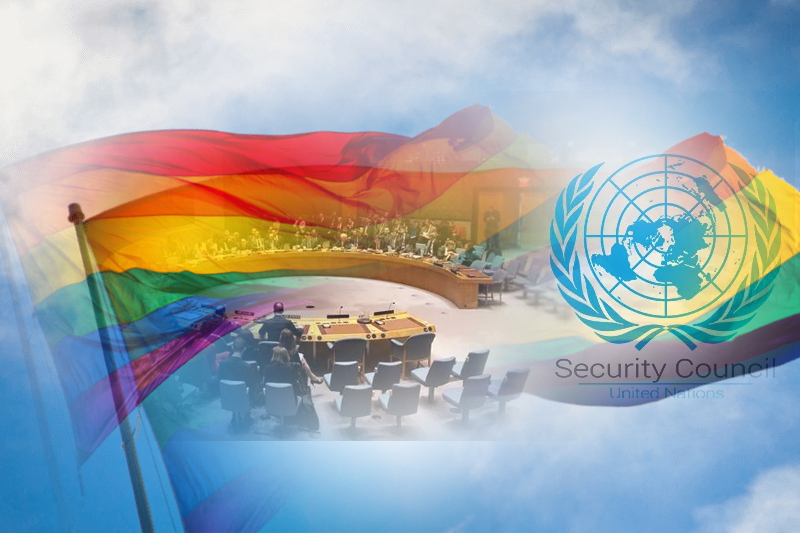

un security council meeting will focus on intersex and lgbtq rights
On March 20, a meeting will be held at the UN with the goal of integrating LGBTQ and intersex rights into the work of the Security Council.
Along with Albania, Brazil, Cyprus, the Czech Republic, France, Greece, Japan, Malta, Switzerland, the U.K., and the LGBTI Core Group, a collection of U.N. nations that have vowed to support LGBTQ and intersex rights, The US Mission to the United Nations is co-sponsoring the meeting.
U.S. Ambassador Linda Thomas-Greenfield will facilitate the gathering of the U.N.
The independent U.N. expert on LGBTQ and intersex issues Victor Madrigal-Borloz is anticipated to give a briefing on LGBTQ and intersex rights around the globe. Colombian Mara Susana Peralta Diversa, a Colombian LGBTQ and intersex advocacy group that took part in negotiations between the government and the Revolutionary Armed Forces of Colombia that resulted in the signing of an LGBTQ-inclusive peace agreement by then-President Juan Manuel Santos and then-FARC Commander Rodrigo “Timochenko” Londoo in 2016; and Afghan LGBT Organization Director Artemis Akbary, who left her nation after the Taliban retook it in 2021; are also anticipated to participate.
A senior administration official on Thursday told reporters during a conference call that “we are asking countries to make specific commitments to address LGBTI human rights concerns in the Security Council” at the meeting. “For instance, we pledge to question U.N. representatives about violations of LGBTQI people’s human rights. Additionally, we pledge to bring up any reports of abuses or other concerns specific to the LGBTI community in our national statements before the Security Council. When appropriate, we’ll also suggest language for Security Council resolutions in cases of flagrant violations.
Another senior administration official stated, “Our view is that we need to build on best practices. “And we need to support a mindset in the Security Council where members regularly ask pertinent questions like: What can the Security Council do to increase protection for LGBTQI+ people in this conflict? Or how can we include intersectional identities in the women, peace, and security agenda? Or have we taken into account the viewpoints of LGBTQI+ people when carrying out a peacekeeping mission or a peace-building process?
In 2015, the Security Council held its first-ever LGBTQ-specific meeting, which concentrated on the persecution of LGBTQ Syrians and Iraqis by the Islamic State. Participants included Jessica Stern, who was the executive director of the International Gay and Lesbian Human Rights Commission at the time, and Samantha Power, who is currently the director of the U.S. Agency for International Development and the special U.S. envoy for the promotion of LGBTQ and intersex rights.
The Pulse nightclub in Orlando, Florida, was formally denounced by the Security Council in June 2016. A few months later, the U.N. Human Rights Council named Vitit Muntarbhorn as the organization’s first independent expert on LGBTQ and intersex issues. In 2018, Madrigal-Borloz took over for Muntarbhorn.
Kelly Knight Craft, then-U.S. Ambassador to the United Nations, and then-U.S. Ambassador to Germany In 2019, Richard Grenell was the event host for a U.N. General Assembly side event that discussed global efforts to decriminalize consensual same-sex sexual relations.
As part of the Biden-Harris administration’s overall foreign policy, President Joe Biden committed the United States to advance LGBTQ and intersex rights abroad in a memo that was signed in 2021. Ned Price, the outgoing State Department spokesperson, later stated to the Washington Blade that one of the White House’s five priorities for advancing LGBTQ and intersex rights internationally is the decriminalization of consensual same-sex relationships.
The Security Council’s five permanent members are the United States, the United Kingdom, France, China, and Russia. The ten non-permanent members are Albania, Brazil, Ecuador, Gabon, Ghana, Japan, Malta, Mozambique, Switzerland, and the United Arab Emirates.
The United Arab Emirates and Ghana are two of the many nations that continue to criminalize consensual same-sex relationships.
Over the past ten years, homosexuality has been officially decriminalized in Gabon and Mozambique. in 2020.
A bill to criminalize allyship and LGBTQ and intersex identity was introduced by a Ghanaian lawmaker in 2021. Late last year, Russian President Vladimir Putin signed a new “propaganda law” targeting transgender and queer people.
On February 24, 2022, Russia began its conflict with Ukraine.
On Thursday, one of the two senior administration officials who spoke with reporters said they were unsure whether Russia would attend the meeting. Without considering what has been happening in Ukraine, the other official continued, “it is impossible to have a conversation about the vulnerabilities of LGBTQI people.”
They said, “I’m sure that’s a question that people are going to be asking. I can envision it being mentioned in a few of the statements made by other missions.
British Steel has issued the layoff notice of 2,700 employees, giving the steelworkers great relief. With the UK government intervening…
According to Reuters energy major ConocoPhillips says it will cut staff as a major result of its $23 billion purchase…
According to a Bloomberg News report released recently, Intel will make heavy job cuts this week as its new leadership…
Swiss Solar Panel manufacturer Meyer Burger has rolled out a significant initiative of deducting the working hours for about 300…
A significant humanitarian act has been carried out by the government of Costa Rica for the 200 deported migrants from…
Blockades on the borders of the country are to be put in place on April 28 if they do not…
This website uses cookies.
Read More